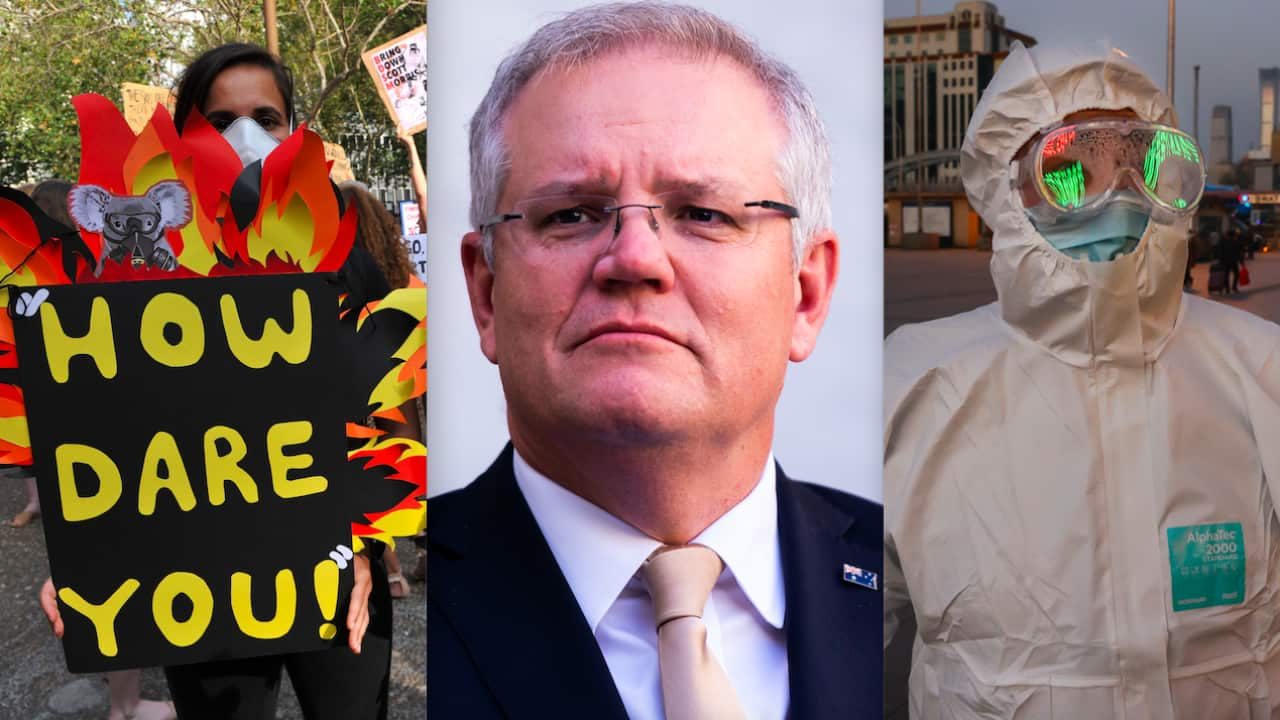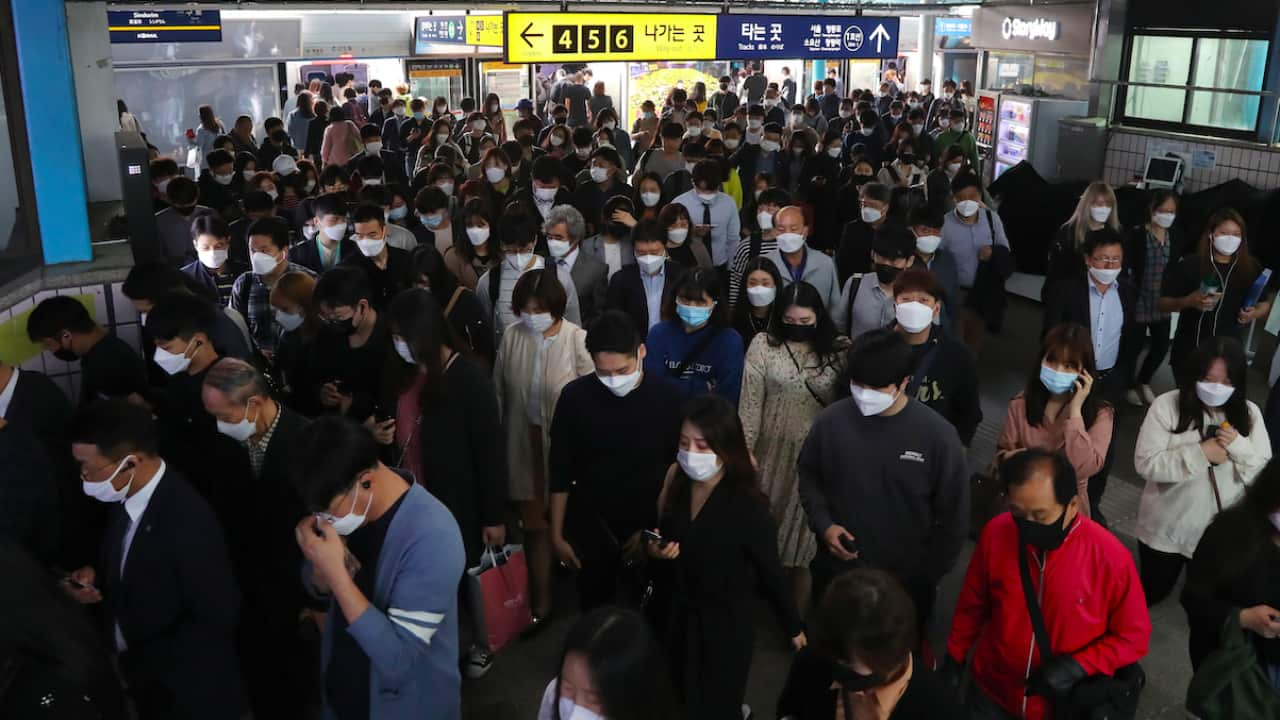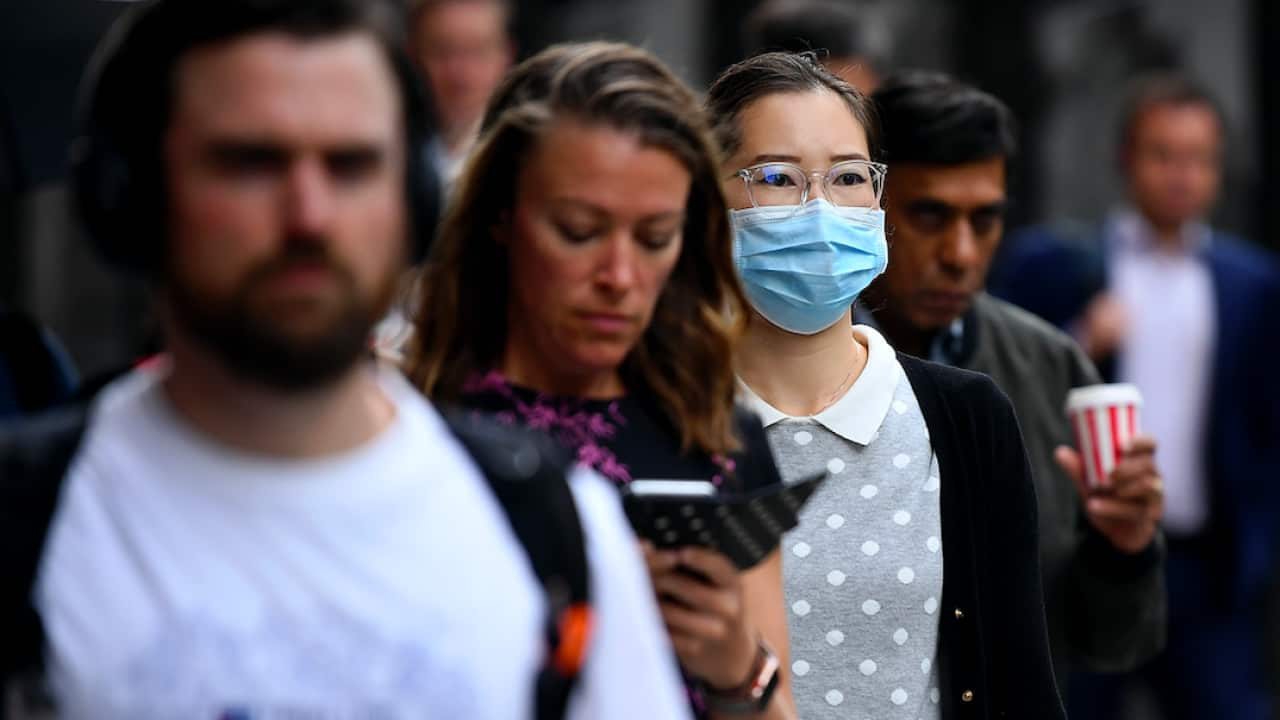Despite consistently being behind in the polls for three years, Scott Morrison led the Coalition to a surprise third term of government at the 2019 election.
In his victory speech on the night of 18 May, Mr Morrison told the Liberal Party faithful: "I have always believed in miracles".
But looking back one year on, former Liberal leader John Hewson gave a more blunt assessment.
"[Mr Morrison] wasn't ready to govern - he didn't expect to win," Dr Hewson told SBS News. Sarah Cameron, a political scientist at the University of Sydney, said Australians appeared willing to give Mr Morrison a chance.
Sarah Cameron, a political scientist at the University of Sydney, said Australians appeared willing to give Mr Morrison a chance.

Prime Minister Scott Morrison on election night at the Wentworth Sofitel Hotel. Source: AAP
"At the time of the 2019 election, he was rated reasonably popular ... More popular than a prime minister at an election since Kevin Rudd's 2007 win," she said.
"Although, that's not so much a statement of how popular Morrison was - it's more a statement about how unpopular our leaders have been in recent times." But Mr Morrison was about to be hit with two seismic events that would define him as a leader.
But Mr Morrison was about to be hit with two seismic events that would define him as a leader.

Prime Minister Scott Morrison on the morning after election day 2019. Source: AAP
Fires and fury
The 2019-2020 bushfire season claimed the lives of at least 34 people and destroyed about 2,700 homes. More than .
From the start of the crisis, Mr Morrison struggled with a comprehensive response.
"He made a mess of it ... [There were] a series of poor calls which caused significant loss of trust and belief in him," Dr Hewson said. In December, Mr Morrison took a Hawaiian vacation mid-crisis. Images of him on holiday as the country was burning were spread across social media.
In December, Mr Morrison took a Hawaiian vacation mid-crisis. Images of him on holiday as the country was burning were spread across social media.

Australian tourists with Scott Morrison in Hawaii. Source: Twitter: @Ben_Downie
Facing intense criticism, Mr Morrison said while he "can't hold a hose or sit in the control room" it was appropriate to return to "provide some moral support".
From there, things did not get much better. He , which a fellow Liberal MP said he "probably deserved".
Mr Morrison and his party were also criticised for . Dr Cameron said the missteps all fitted into a common theme.
Dr Cameron said the missteps all fitted into a common theme.

A firefighter declines to shake the prime minister's hand. Source: ABC Australia
"The prime minister and the government weren't seen as taking a leadership role in handling the crisis … [There was] a general perception that the crisis wasn't been responded to," she said.
"The approval rating of the government and Morrison's popularity really plummeted." Brent Coker, a consumer psychologist at the University of Melbourne, said Mr Morrison's public persona during the fires was problematic.
Brent Coker, a consumer psychologist at the University of Melbourne, said Mr Morrison's public persona during the fires was problematic.

NSW Rural Fire Service crews fight the Gospers Mountain fire. Source: AAP
He said rather than showing consistent empathy, Mr Morrison would sometimes give "uncaring signs and signals".
"A lot of people were complaining about the 'Scott Morrison smirk'," he said.
Dr Coker said he also had a tendency to jump between "portraying himself as another Aussie" and being a "stern politician".
"One of the problems is he's neither here nor there, he doesn't have a strong character, and doesn't have strong positioning. One of the traits of good leadership, or iconic leaders, is portraying some sort of strong character."
Taking on a pandemic
Since emerging from the Chinese city of Wuhan in late 2019, COVID-19 has infected more than four million people and killed more than 300,000.
"It's being discussed as the greatest challenge Australia has faced since World War II," Dr Cameron said. But in the early months of 2020, different countries responded to the crisis with very different degrees of urgency.
But in the early months of 2020, different countries responded to the crisis with very different degrees of urgency.

People wear protective masks and suits at Beijing Railway Station. Source: Getty
Consumer psychologist Dr Coker said the contrast between Mr Morrison's response to the fires and the virus could not be more pronounced.
"I think Scott Morrison learned quite a lot from the bushfire crisis. The reaction to the pandemic seemed to be very different," he said.
"Most notably, we were one of the first countries in the world to take a front foot approach and declare it a pandemic." The Morrison government was also quick to close borders and propose dramatic restrictions, both credited as helping Australia avoid catastrophe.
The Morrison government was also quick to close borders and propose dramatic restrictions, both credited as helping Australia avoid catastrophe.

Scott Morrison speaks during a press conference following a national cabinet meeting. Source: Getty
"Whether he would have done this without the bushfire crisis is interesting to think about. Perhaps Australia would have been lagging with the rest of the world," Dr Coker said.
It is a point echoed by Dr Cameron.
"In this crisis, the government has given the impression that they are regularly communicating with the public and are taking actions to respond to the crisis ... It's been a very different approach," she said.
As other countries are dealing with skyrocketing case numbers and deaths, Australia's infection curve has flattened and lockdown restrictions are already being eased.
A poll released by the Lowy Institute last week found 93 per cent of Australians thought the government had handled COVID-19 very or fairly well so far.
Economic plans ruined
In the space of 12 months, perhaps one of the biggest changes in government messaging has been around the economy.
Going into the 2019 election, the Coalition was far lighter on plans and promises than the Labor Party.
But time and time again, Mr Morrison said his party's economic knowhow would help deliver the commonwealth's first surplus in more than a decade.
Confidence was so high that the Liberal Party was selling "Back in Black" mugs as recently as March. But COVID-19 has seen the government spend billions in rescue programs for its residents and businesses, with the .
But COVID-19 has seen the government spend billions in rescue programs for its residents and businesses, with the .

The Back in Black mug. Source: eBay
"It's looking to be a greater economic crisis than the 2008 Global Financial Crisis ... [And] what we typically see is voters punishing governments for poor economic outcomes," Dr Cameron said.
The surplus (and the Liberal Party mugs) are now nowhere in sight.
Migration and racism
The government's migration agenda has also altered since its election win.
In early 2019, the Coalition announced it would slash the targeted annual intake of permanent migrants by up to 30,000.
"Congestion-busting" language around migration continued in the following months and in December two new visas were introduced aimed at settling more skilled migrants in regional areas.
Meanwhile, all asylum seekers were moved off Manus Island to other facilities in the Papua New Guinea capital Port Moresby in late 2019. The move has been criticised by . But coronavirus dramatically changed the migration landscape.
But coronavirus dramatically changed the migration landscape.

The racist slur spray-painted on the garage door of a Chinese-Australian family in Melbourne. Source: SBS News
With widespread travel bans, migration intake is expected to shrink by more than 85 per cent next financial year compared to 2018-19 levels.
And Mr Morrison faced criticism as the majority of COVID-19 assistance was not made available for temporary visa holders and international students, with him telling them "to return to their home countries".
But Mr Morrison has been praised for calling out racism against Asian-Australians during the pandemic.
"Stop it … I deplore that sort of behaviour against any Australian regardless of their ethnicity or their religion or whatever it happens to be," he told reporters last month.
"And I think that is the view of all Australians. So we have to call that sort of thing out. It's not on."
Early days
Those SBS News spoke to all said Mr Morrison's biggest challenges were still ahead.
"With the pandemic, he's made a comeback, he's certainly been popular in the way he's coordinated the response so far ... But the recovery phase is going to be the most important part," Dr Hewson said. "[The government] doesn't seem to have any detail yet on how it's going to come back.
"[The government] doesn't seem to have any detail yet on how it's going to come back.

A crowded Sydney street on Monday. Source: AAP
"It takes a long time to work your way out of a recession or a dramatic increase in unemployment ... It's a painful process."
Dr Hewson also said climate change will soon take a prominent place in Australian politics once again.
"[Mr Morrison has] recognised that you can put ideology aside and you can look at what is in the national interest ... The question is now, can he do that with the issues that are really bigger and more significant like climate change?" he said.
"He took the consistent advice of experts [during the pandemic] … There's some extremely strong scientific advice on climate.
"He's one year in, he's got two years to go."
People in Australia must stay at least 1.5 metres away from others. Check your state’s restrictions on gathering limits.
Testing for coronavirus is now widely available across Australia. If you are experiencing cold or flu symptoms, arrange a test by calling your doctor or contact the Coronavirus Health Information Hotline on 1800 020 080.
The federal government's coronavirus tracing app COVIDSafe is available for download from your phone's app store.
SBS is committed to informing Australia’s diverse communities about the latest COVID-19 developments. News and information is available in 63 languages at .












